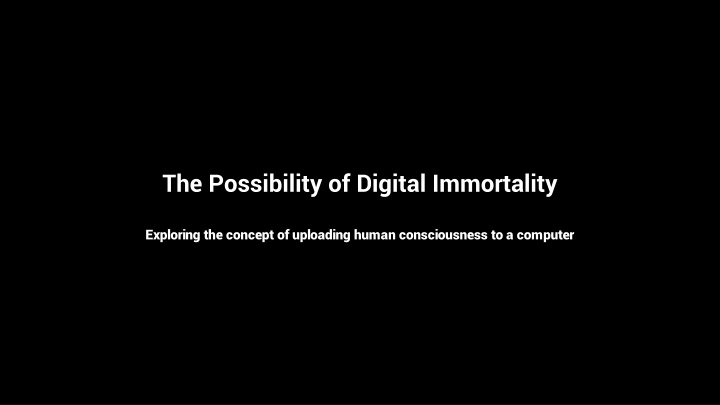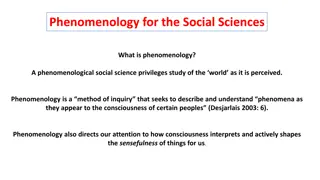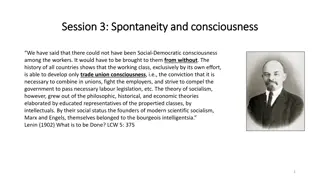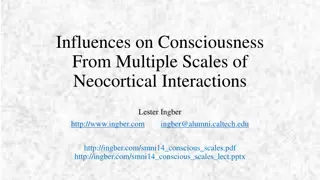The Possibility of Digital Immortality: Exploring Consciousness Upload
Loss and mortality are inevitable in life. The concept of immortality has intrigued humanity for centuries. Transhumanism delves into transferring consciousness to a digital dimension, raising serious implications and potential issues. The LifeLike project aims to create avatars with stored knowledge and mannerisms, not true digital immortality but virtual representations. An experiment with a worm's connectome and the challenge of digitizing the human brain pose questions about consciousness and identity. Ethical and philosophical considerations arise when transferring to a digital medium. Digital immortality may bring about unemployment crises and devaluation of human labor, with concerns about cruelty and suffering in experimentation and emulation.
Download Presentation

Please find below an Image/Link to download the presentation.
The content on the website is provided AS IS for your information and personal use only. It may not be sold, licensed, or shared on other websites without obtaining consent from the author.If you encounter any issues during the download, it is possible that the publisher has removed the file from their server.
You are allowed to download the files provided on this website for personal or commercial use, subject to the condition that they are used lawfully. All files are the property of their respective owners.
The content on the website is provided AS IS for your information and personal use only. It may not be sold, licensed, or shared on other websites without obtaining consent from the author.
E N D
Presentation Transcript
The Possibility of Digital Immortality Exploring the concept of uploading human consciousness to a computer
Introduction Loss and mortality are inevitable aspects of life. The concept of immortality has intrigued humanity for centuries. Transhumanism explores the idea of transferring consciousness to a digital dimension. While the idea may seem intriguing, there are serious implications and potential issues. Photo by Pexels Photo by Pexels
LifeLike Project and Avatars The LifeLike project aims to create avatars with with stored knowledge and mannerisms. Avatars are not true digital immortality, but rather virtual representations of individuals. Some propose uploading massive amounts of personal data to ensure remembrance. The idea of sending this data into space for extraterrestrial discovery is also suggested. Photo by Pexels Photo by Pexels
The Worm Experiment An experiment with a worm's connectome was conducted. The worm's neural connections were recreated in recreated in a Lego robot. The robot exhibited similar behavior to the original worm, raising questions about consciousness and identity. Recreating the human brain's connectome is a much greater challenge due to its complexity. Photo by Pexels Photo by Pexels
The Challenge of Digitizing the Brain The human brain has billions of neurons and trillions of connections. Scientists suggest the possibility of cutting the brain into pieces, scanning them, and transferring the data to a computer. However, such a procedure would require the death of the original person, raising questions about consciousness and identity. Replacing neurons with artificial ones may be a possible approach, but it raises the question of whether the new brain is still the same as the original. Photo by Pexels Photo by Pexels
Ethical and Philosophical Considerations Questions of consciousness and identity arise when transferring to a digital medium. Creating simulations of consciousness may not truly capture the essence of individual's consciousness. The impact on individual rights and the potential for creating multiple copies raises ethical concerns. Other considerations include the loss of sensory experiences and the potential for existential crises. Photo by Pexels Photo by Pexels
Limitations and Potential Dangers Digital immortality may lead to unemployment crises and a devaluation of human labor. Concerns about cruelty and suffering in the process of experimentation and emulation raise ethical questions. The potential for hacking, viruses, and the destruction of digital copies present risks. Religious and existential questions arise, challenging traditional beliefs about life after death. Photo by Pexels Photo by Pexels
Conclusion Digital immortality is a complex and controversial concept with numerous challenges. The possibility of true digital immortality is uncertain and may not be achievable in the near future. Ethical and philosophical considerations must be addressed before pursuing such technology. While the idea of digital immortality may be intriguing, it raises profound questions about consciousness, identity, and the nature of existence. Photo by Pexels Photo by Pexels























